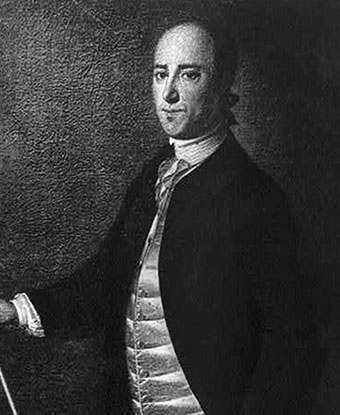Last updated: June 14, 2024
Person
Christopher Gadsden

Library of Congress
Christopher Gadsden was born in Charleston on February 16, 1724, the son of Elizabeth and Thomas Gadsden, a customs collector. Gadsden received a classical education in England before completing a four-year apprenticeship in Philadelphia. Between 1745 and 1747, he served as purser aboard the British man-of-war Aldborough. With money from his time at sea and a large inheritance from his parents, who had both died by 1741, Gadsden started one of the most profitable mercantile careers in the Carolinas. By 1774, he owned four stores, several merchant vessels, two rice plantations, a residential district in Charleston called Gadsdenboro, and a large wharf on the Cooper River. A portion of Gadsden’s Wharf is now the site of the Liberty Square Visitor Education Center, a ferry departure location for Fort Sumter.
Possessing financial independence and a desire to serve, Gadsden pursued public office. In 1757 he began his nearly three decades of service in the Commons House of Assembly. He first revealed himself as a vocal defender of American rights during the Cherokee War by attacking British colonel James Grant for taking command of local troops above provincial colonel Thomas Middleton.
Gadsden continued to champion American home rule and to oppose Parliamentary supremacy at the Stamp Act Congress in New York in 1765. During the next decade, Gadsden joined with Charleston mechanics (Sons of Liberty) to lead the local Patriots against every perceived threat to American rights. Gadsden’s influence and dedication earned him election to the First Continental Congress where his extremism manifested itself in proposals to reject all Parliamentary legislation since 1763, to attack the Royal Navy in American waters, and to instruct each colony to prepare for war.
Gadsden returned to South Carolina in February 1776 to serve as colonel of the First Regiment and as a member of the Provincial Congress, during which time he coauthored the South Carolina constitution of 1776. In the summer of 1776, Gadsden commanded Fort Johnson during the British attack on Sullivan’s Island. He offered congratulations to Col. William Moultrie after the decisive victory over the Royal Navy.
In 1778, Gadsden helped secure the disestablishment of the Anglican Church and popular election of senators in the new state constitution. Gadsden served as vice president, later as lieutenant governor once South Carolina joined the other colonies under the Articles of Confederation. Similar to the Patriot firebrand of Massachusetts, Samuel Adams, Gadsden’s role diminished following the Declaration of Independence. Gadsden’s zealous personality also proved counterproductive in working relationships with other officers and politicians. In 1777, Gadsden resigned his commission as brigadier general after conflict with General Robert Howe.
During the siege of Charleston in 1780, Gadsden insisted the Continental Army remain in Charleston, contributing to the largest surrender in American military history until the Civil War. Maj. Gen. Benjamin Lincoln allowed the attendance of the Privy Council in his councils of war. Historians agree that Lincoln should not have allowed Gadsden to dominate the military conferences. Gadsden, representing South Carolina after the departure of Governor Rutledge, declared that "the Militia were willing to Live upon Rice alone rather than give up the Town upon any Terms."After the surrender of Charleston, Gadsden was paroled to his home.
British General Earl Cornwallis, fearing the influence leading Patriots had over the populace, arrested about twenty paroled civil officers.
"His Lordship in order to secure the quiet of the province, finds himself under the necessity to direct the Commandant to order several Persons to change their Place of Residence on Parole from Charles Town to St. Augustine; His Lordship has further directed that a proper Vessell be provided to carry their Baggage with them."
When they arrived, Governor Tonyn of British East Florida offered them freedom of the town if they would give their parole. Gadsden was the only one to refuse, even with the threat of imprisonment, stating "Prepare it then. I will give no parole, so help me God!" Gadsden suffered during his time as a prisoner in the jail of Castillo de San Marcos. He endured 42 weeks of confinement, suffering from a poor diet and psychological warfare as the British lied to him about the progress of the war and then threatened him with hanging should the Patriots hang Major John Andre for his role in Arnold's treason. Fortunately for the South Carolinians, they were included in a general exchange of prisoners and arrived in Philadelphia in July 1781.
Gadsden returned to public service, joining the state's House of Representatives in Jacksonboro. At this session, Governor Rutledge surrendered his office. Gadsden was elected as governor, but declined citing his poor health. He returned to public service briefly in 1788 to vote for ratification of the US Constitution and again in 1790 to serve in the state's constitutional convention. Gadsden died on August 28, 1805 from head injuries suffered in a fall near his home.
